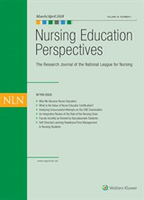
Nursing Education Perspectives
Scope & Guideline
Exploring New Horizons in Nursing Pedagogy
Introduction
Aims and Scopes
- Integration of Mental Health in Nursing Education:
The journal highlights the importance of mental health education, emphasizing innovative approaches such as mindfulness, trauma-informed care, and resilience training for nursing students. - Innovative Teaching Strategies:
There is a strong focus on the development and implementation of innovative educational practices, including simulation-based learning, virtual reality, and experiential learning to enhance nursing competencies. - Addressing Diversity, Equity, and Inclusion:
The journal emphasizes the need for culturally competent care and the integration of diversity and equity principles in nursing curricula to prepare future nurses for a diverse patient population. - Research on Educational Outcomes:
Research efforts are directed towards assessing the effectiveness of various educational practices, mentorship programs, and curriculum innovations in improving student performance and retention. - Collaboration and Interprofessional Education:
The journal promotes interdisciplinary approaches to nursing education, encouraging collaboration among healthcare disciplines to enrich the educational experience.
Trending and Emerging
- Mental Health and Well-Being:
Recent publications emphasize the importance of mental health support for nursing students, including strategies for addressing anxiety, resilience, and self-care practices. - Technology Integration in Education:
There is a surge in research focused on integrating technology, such as virtual simulations and digital tools, into nursing education to enhance learning experiences and competencies. - Cultural Competence and Health Equity:
Emerging themes include the necessity of culturally competent care and addressing health disparities, reflecting a broader societal focus on equity in healthcare. - Competency-Based Education:
The transition to competency-based education models is gaining traction, with a focus on aligning educational outcomes with real-world nursing practice requirements. - Interprofessional Education and Collaboration:
Collaborative initiatives between nursing and other healthcare disciplines are increasingly highlighted, promoting a holistic approach to healthcare education.
Declining or Waning
- Traditional Lecture-Based Teaching Methods:
There is a noticeable decrease in publications focused on conventional lecture-based teaching methods, as the emphasis shifts towards more interactive and student-centered approaches. - Generalized Nursing Education Research:
Research that lacks a specific focus or application to current nursing challenges is becoming less frequent, indicating a trend towards more targeted and relevant studies. - Basic Skills Training:
Topics centered on basic skills training without an innovative or integrative approach are declining, as the journal prioritizes advanced pedagogical strategies and critical thinking development. - Retention of Outdated Educational Practices:
Research and discussions surrounding older, less effective educational practices are waning, reflecting a commitment to modernizing nursing education. - Limited Focus on Non-Academic Factors:
There is a decreasing emphasis on non-academic factors in nursing education research, as the journal increasingly prioritizes evidence-based practices and outcomes related to student success.
Similar Journals
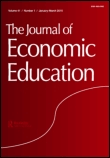
JOURNAL OF ECONOMIC EDUCATION
Exploring the Nexus of Economics and LearningJOURNAL OF ECONOMIC EDUCATION, published by Routledge Journals, Taylor & Francis Ltd, serves as a pivotal platform for the dissemination of research in the vital intersection of economics and education. With an ISSN of 0022-0485 and an E-ISSN of 2152-4068, this esteemed journal has been contributing to the field since 1969 and continues to evolve with influential insights projected through to 2024. Ranking in the Q2 category for both Economics and Econometrics, and Education as of 2023, it demonstrates a significant commitment to enhancing educational practices in economics. Researchers and educators alike will find value in its empirical studies, theoretical explorations, and innovative pedagogical approaches. Although currently not offering open access, the journal maintains a competitive reputation with a Scopus rank placing it in the 54th and 47th percentiles across its related fields. Join the scholarly dialogue that shapes the future of economic education and informs teaching methodologies across the globe.
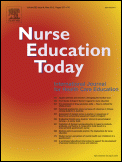
NURSE EDUCATION TODAY
Shaping the Future of Nursing Through Innovative Research.NURSE EDUCATION TODAY is a prestigious academic journal dedicated to advancing the field of nursing education and practice. Published by Churchill Livingstone in the United Kingdom, this journal has been a vital resource since its inception in 1981, with a commitment to improving the standards and methodologies in nursing training. As evidenced by its impressive Q1 ranking in both Education and Nursing categories in 2023, and a remarkable 96th percentile ranking in Nursing (General Nursing), NURSE EDUCATION TODAY stands out as a leading source of evidence-based research, innovative educational strategies, and critical discussions that shape the future of nursing education. The journal provides a platform for researchers, practitioners, and educators to share their findings and experiences, making it essential reading for all stakeholders in the healthcare education landscape. Although it does not offer Open Access, its substantial impact on the nursing education community is significant, with ongoing contributions up to 2024 and beyond.
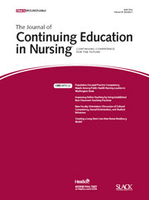
JOURNAL OF CONTINUING EDUCATION IN NURSING
Elevating Nursing Education for Tomorrow's Leaders.JOURNAL OF CONTINUING EDUCATION IN NURSING, published by SLACK INC, is an esteemed journal dedicated to the field of nursing education and professional development. Since its inception in 1970, it has actively contributed to the growth of nursing knowledge and practice, making it an essential resource for educators, practitioners, and researchers alike. The journal holds a solid standing with an impact factor reflecting its importance, categorized as Q2 in Nursing (Miscellaneous) and Review and Exam Preparation, and Q3 in Education according to the 2023 rankings. With a mission to support ongoing education among nursing professionals, it provides a platform for innovative research, evidence-based practices, and comprehensive reviews that enhance nursing education. The journal is accessible in print and does not currently offer open access options, ensuring exclusivity in its high-caliber content. As it converges into 2024, the JOURNAL OF CONTINUING EDUCATION IN NURSING remains pivotal in shaping the future of nursing education and facilitating professional excellence.

AEM Education and Training
Advancing education at the forefront of emergency care.AEM Education and Training is a leading peer-reviewed journal published by WILEY, focusing on the intersection of education, emergency medicine, and nursing, with a commitment to advancing knowledge and practice in these critical fields. Launched in 2017, this journal has quickly established itself as a key resource, as evidenced by its impressive Q2 ranking in both Education and Emergency Medicine, and a top-tier Q1 ranking in Emergency Nursing as of 2023. The journal aims to disseminate high-quality research that enriches educational practices and improves clinical outcomes, serving as a vital platform for healthcare educators and practitioners. With the growing importance of effective training in emergency settings, AEM Education and Training plays an essential role in shaping future leaders in health education and patient care. Researchers, professionals, and students will find an array of insightful articles that address contemporary challenges and innovations in their fields. Although currently not an open-access journal, its findings contribute significantly to the broader discourse in educational practices and emergency care.
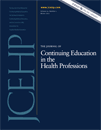
JOURNAL OF CONTINUING EDUCATION IN THE HEALTH PROFESSIONS
Elevating Professional Standards with Cutting-Edge ResearchJOURNAL OF CONTINUING EDUCATION IN THE HEALTH PROFESSIONS, published by Lippincott Williams & Wilkins, serves as a pivotal resource in the interrelated fields of education, e-learning, and healthcare. Established in 1988, this esteemed journal aims to advance the knowledge and skills of healthcare professionals through innovative research and practical applications in continuing education. With an ISSN of 0894-1912 and an E-ISSN of 1554-558X, this peer-reviewed publication boasts a commendable reputation, reflected in its Q2 quartile ranking in the categories of Education, E-learning, and Miscellaneous Medicine for 2023. The journal is indexed in Scopus, ranking 546 out of 1543 in Social Sciences Education, placing it in the top 64 percentile. By focusing on the dissemination of impactful studies, the journal plays a critical role in shaping educational strategies that enhance professional development and improve healthcare delivery. Although not an open-access publication, it eagerly invites contributions from researchers and practitioners keen to explore the essential dynamics of continuing education in health professions.
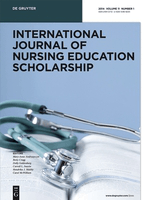
International Journal of Nursing Education Scholarship
Advancing nursing education through innovative research.International Journal of Nursing Education Scholarship is a crucial academic platform dedicated to advancing the field of nursing education through rigorous research and scholarship. Published by WALTER DE GRUYTER GMBH in Germany, this journal serves as a key resource for researchers, educators, and practitioners in nursing and related educational fields. With an impressive impact factor and a strong Scopus ranking, notably Rank #44 in General Nursing, the journal occupies a respected position within the Q2 category in both the Education and Nursing sectors. Its open access policy enhances the dissemination of critical findings, facilitating broader access to high-quality nursing education research. Spanning from 2003 to 2025, this publication is committed to fostering innovation and excellence in nursing education, promoting evidence-based practices that ultimately benefit healthcare systems worldwide. As a vital resource for academia and practice, International Journal of Nursing Education Scholarship continuously encourages the discourse on best practices and emerging trends in nursing education.
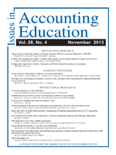
ISSUES IN ACCOUNTING EDUCATION
Cultivating Knowledge for Effective Curriculum DevelopmentISSUES IN ACCOUNTING EDUCATION is a leading academic journal published by the American Accounting Association, dedicated to advancing the field of accounting education through innovative research and practical applications. With an ISSN of 0739-3172 and an E-ISSN of 1558-7983, this journal has established itself as a key resource for accounting educators, researchers, and practitioners alike. Ranked in the Q2 category for Education and Q3 for Accounting in 2023, it plays a critical role in disseminating knowledge that enhances pedagogical practices and curriculum development across the globe. The journal is recognized for its robust contributions to the Social Sciences and Business Management fields, with Scopus rankings placing it in the 58th and 42nd percentiles, respectively. Although it does not offer open access, the journal is committed to fostering scholarly dialogue and contributing to the continuous development of accounting education from 2009 to 2024. Researchers, educators, and students will find invaluable insights and findings that not only shape academic discourse but also inform best practices in the classroom.
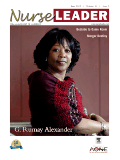
Nurse Leader
Shaping Tomorrow's Nurse Leaders TodayNurse Leader is a prestigious journal published by ELSEVIER SCIENCE INC, dedicated to the dynamic field of nursing leadership and management. With an ISSN of 1541-4612 and an E-ISSN of 1541-4620, this journal has been a vital resource since its inception in 2003, covering emerging topics and innovative practices that shape the future of healthcare leadership. As a Q3 category journal in the 2023 rankings, it holds a ranked position of #24 out of 40 in the Scopus Nursing Leadership and Management category, highlighting its significance in the academic community with a 41st percentile standing. Although not an open access journal, Nurse Leader provides valuable insights and research findings that equip researchers, professionals, and students with the knowledge and tools necessary for effective leadership in nursing. With a commitment to advancing the profession, the journal remains a crucial platform for sharing impactful research and fostering collaboration among practitioners in the United States and beyond.
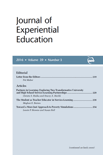
Journal of Experiential Education
Transforming Education Through ExperienceJournal of Experiential Education, published by SAGE Publications Inc, stands as a pivotal resource in the field of education, focusing on innovative pedagogical strategies and experiential learning methodologies. With an ISSN of 1053-8259 and an E-ISSN of 2169-009X, this journal is recognized for its rigorous academic contributions, holding a commendable Q2 category ranking in Education for 2023, and securing a Scopus ranking of #495 out of 1543, placing it in the 67th percentile for social sciences education. The journal's scope encompasses diverse aspects of experiential education, essential for researchers, educators, and practitioners looking to enhance learning outcomes through practical application. With a history spanning from 1996 to 2024, it continues to foster dialogue and disseminate groundbreaking research that addresses contemporary educational challenges. Although it does not currently offer Open Access options, the journal's impact and relevance remain significant, making it indispensable for advancing knowledge in the education sector.
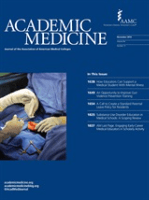
ACADEMIC MEDICINE
Advancing the Future of Medical EducationACADEMIC MEDICINE is a premier journal published by Lippincott Williams & Wilkins, focusing on the multifaceted realm of medical education and training. Since its inception in 1940, the journal has become an essential resource for researchers, educators, and healthcare professionals dedicated to advancing the field of academic medicine. With an impressive Q1 ranking in both Education and Miscellaneous Medicine categories as of 2023, it ranks among the top publications in its field, reflective of its significant academic impact. The journal is indexed in Scopus, where it holds a commendable position within the 93rd percentile of Social Sciences Education, affirming its influence on contemporary medical education discourse. While not an open-access journal, ACADEMIC MEDICINE is committed to disseminating high-quality research, fostering knowledge exchange, and encouraging innovation in medical training across the globe. It serves as a critical platform for sharing the latest findings and practical insights in medical education, making it an indispensable resource for scholars and practitioners aiming to enhance their academic and clinical expertise.